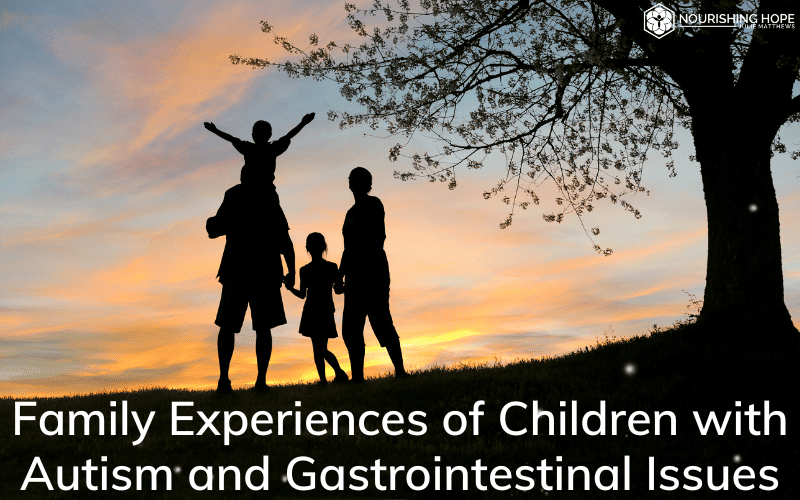
One of the most common things I’ve heard in my 20+ year career is that parents know there is something going on with their child’s gut but that their concerns are dismissed…especially if their child has a diagnosis of autism.
Downstream Effects of GI Issues
GI issues don’t just impact the gut. They impact many facets of everyday life including the child’s ability to learn in school and in therapies, social settings, their eating habits, and definitely weigh on the family especially when there are behaviors like self-injury that are co-occurring.
I was happy to read a qualitative study published in 2021 [1] that focused on these concerns and the various areas that are impacted by GI issues. The researchers interviewed 12 families of children with autism spectrum disorder and gastrointestinal issues to gain more insight into the issues they faced.
Parents’ Perspectives
When asked, 4 main themes were found in families of children with ASD and GI issues:
Communication challenges: Children with autism often have difficulty verbally expressing when they are experiencing GI symptoms. This requires parents to rely non-verbal behaviors to identify when their child is experiencing GI distress. Whether the child is pre-verbal or just limited in their ability to effectively explain what is happening in their body, the end result is that parents must play the role of “detective” to try and discern what is going on to communicate with healthcare professionals.
Impact on daily life: As you can imagine, GI issues impact a child’s ability to participate in activities. I mean, do you feel like going to a party with a tummy ache? Imagine trying to learn or attend therapy, or even just go to a movie with your family if you don’t feel well. And if you add in issues with verbal communication, you can understand how frustrating the whole situation can be!
Caregiver stress: Marital challenges are higher in families with a special needs child. And if there are GI issues along with behavioral manifestations, that can add to the feelings of stress. No one likes to see their child in pain or discomfort and if they are unable to determine the cause, that stress and anxiety can be magnified and impact the family unit.
Challenges getting help: And lastly, and this one is the one that makes me so upset…parents often face challenges accessing quality healthcare for their child’s GI problems. I’ve had families tell me that their provider simply chalks GI issues up to “just being a part of autism!” That is infuriating as both a clinician working very successfully with families and a researcher. The truth is, the right nutritional intervention can bring about profound improvements (in some cases even a loss of diagnosis) so telling families there is nothing they can do because it is just “autism” is tragic.
Comorbid Behavioral Manifestations of GI Issues
It is important to mention that GI symptoms are also typically associated with behavioral symptoms which can include:
Strong dietary preferences, sensitivities or allergies
I’ve seen many children self-select foods because of underlying factors like sensitivities, gut dysbiosis, or opiate reactions. Also, GI discomfort due to foods that are problematic can result in a child not wanting to eat in general.
Toileting problems such as delayed potty training, encopresis (soiling clothing), and wetting the bed
These toileting challenges can be due to gastrointestinal issues and/or have biochemical causes that certain foods can influence.
Aggressive, irritable, externalizing, and self-injurious behavior
Because of the brain-gut/microbiome connection, gastrointestinal conditions can cause negative behaviors. Additionally, certain foods or food compounds can trigger or exacerbate behaviors such as aggression or self-injury. Common culprits here can range from food additives, colorings, gluten, oxalates, histamine, phenols, and salicylates.
Anxiety and mood problems and other co-occurring psychological or somatic conditions
As with aggression and behavioral challenges, GI issues can also cause and exacerbate anxiety and mood problems. Improving gut health, by avoiding inflammatory foods and adding beneficial foods, can help mood. There is a growing body of research looking at food reactions that contribute to mental health issues including anxiety, mood dysregulation, depression, etc. Again, food additives and colorings can be triggers, as well as blood sugar issues, picky eating leading to nutrient deficiencies, even the makeup of the microbiome (which is heavily influenced by diet) can contribute to anxiety and mood issues.
Therapeutic diets can help
When there is something going on in the gastrointestinal tract, it has downstream, whole-body effects! The good news is that the food your child eats can play an important role in all of this.
Choosing the right therapeutic diet can make a world of difference. Adding foods that fuel beneficial bacteria, reduce inflammation, and nourish the body and brain, can make a significant improvement. And avoiding foods that are not tolerated, create inflammation, trigger behaviors, and negatively affect the gut are also important.
Your child is unique and so are their nutritional needs. Personalizing therapeutic diet and nutrition choices for your child and family can really help. I know because I’ve seen it first hand with my clients and the families I work with.
The Benefits of Nutritional Intervention
This qualitative study really sheds light on some of the issues facing autism families and frankly are why I created Nourishing Hope for Healing Kids, my program for parents. Too many families are being discounted or told there was nothing they could do yet my own experience working with clients and our study showed the improvements that are possible. In fact, all of the parents in my program are asked to complete evaluations before and after the program to note changes.
These are just some of the improvements reported:
- 88% reported improvement in autism symptoms
- 66% reported improvement in aggression
- 63% reported improvement in GI issues
- 40% reported improvement in anxiety
- 36% reported improvement in irritability and mood
- 33% reported improvement in depression
I love seeing papers being published on a parent’s perspective and the connection between the gut and behavior. We need to keep shedding light on this connection and not accept that GI issues are just “a part of autism.”
I chose the name Nourishing Hope for a reason. There IS hope for improvement through personalized nutrition.
If you want to learn more about this topic and understand advanced nutrition concepts like how salicylates, oxalates, histamine, glutamate, FODMAPs and more can be contributing to gut issues and how to create your own personalized nutrition plan, join my brand new course, Improving Gut Health Through Therapeutic Diets today.
Reference:
[1] Holingue C, Poku O, Pfeiffer D, Murray S, Fallin MD. Gastrointestinal concerns in children with autism spectrum disorder: A qualitative study of family experiences. Autism. 2022;26(7):1698-1711. doi:10.1177/13623613211062667




0 Comments